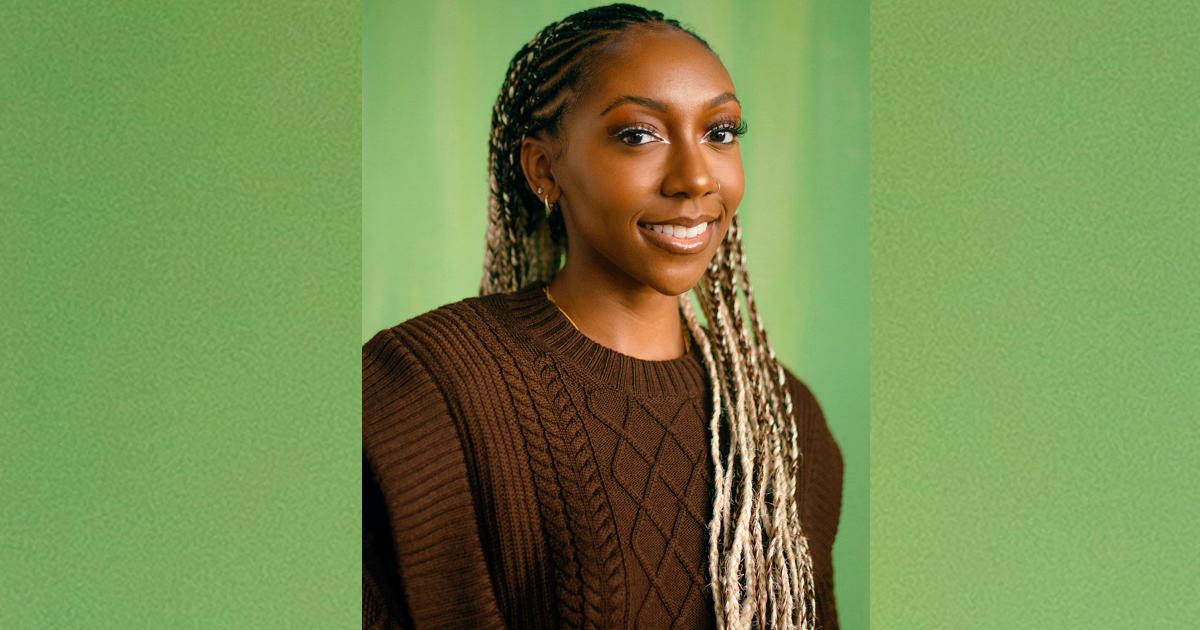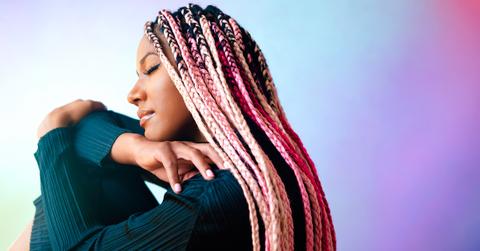This Black-Owned, Woman-Owned Company Is Making Braiding Hair From Banana Fibers (Exclusive)
Published Sept. 28 2022, 11:00 a.m. ET
Hair braiding is far more than just a trend; the style goes back thousands of years, has deep roots in Black culture, and holds a lot of meaning to many Black women. But as time has gone on, it’s become commonplace for braided hair extensions to be made from synthetic materials and treated with toxins, leading many people who wear braids to experience itching and other uncomfortable symptoms.
That’s what happened to Ciara Imani May — something that ultimately inspired her to start the company Rebundle, which makes eco-friendly, biodegradable, and non-toxic braiding hair from banana fibers.
“I started the company back in 2019, after my own experience with hair extensions — having really negative scalp irritation and breaking out and wanting to know more about why this was happening to me — why it was common with hair extensions — and didn't find anything on the market that was readily available,” Ciara Imani May tells Green Matters.
“So I thought … I could figure out how to make a product that was both comfortable and sustainable, but also address the waste problem that I was seeing in the hair industry,” she continued.
To learn more about Rebundle’s eco-friendly braids, Green Matters recently caught up with May via video chat in honor of her new partnership with the Tom’s of Maine Incubator, a new seven-month program launching today. As part of the program’s first iteration, May will be among a group of BIPOC leaders from the environmental space, who will all mentor a group of five rising BIPOC climate activists.
“[I] involved myself with a lot of [incubators] when I was first getting started with Rebundle,” May says. “And I jumped at the opportunity to support another environmentally-focused entrepreneur in their their journey to start a company that not only does good for people, but the planet as well.”

Ciara Imani May, Co-Founder of Reubndle
Braiding hair is often made from plastic and various toxins.
When May began researching the issues with braids, she was surprised to find that most braids are made with synthetic (plastic-derived) materials — primarily polyvinyl chloride (PVC), which is known as one of the most environmentally harmful plastics. Various scientific studies have also found that PVC contains endocrine disruptors and carcinogens.
“I couldn't figure out why these materials were even allowed to be used in this application, especially given the wide breadth of use of hair extensions in the Black community,” May says. “No one seemed to be paying attention to what could be happening beneath the surface.”
In addition, May wondered how the industry was getting away with producing so many hair extensions that just wind up in landfills.
“There was a real burning question there that needed to be answered, and that people needed to pay attention to,” May recalls thinking. “Even if you didn't wear braids, you could understand why this would be a problem beyond just the Black community.”
In response to these issues in the braiding industry, Ciara Imani May founded Rebundle.
May, who studied Business Management and Entrepreneurship at the University of Missouri-Columbia and later got her master’s in Social Entrepreneurship at the University of Southern California, began to research all-natural fibers that could work as hair braids.
After tons of research, May discovered the perfect all-natural fibers to create Braid Better, which became the very first product by Rebundle. She officially co-founded in 2019 with business partner Danielle Washington.
Braid Better is a bundle of braidable hair that comes in a variety of colors, made out of naturally extracted banana fiber. “What's good about banana is that it really matches closely to my hair texture, and it has a certain versatility to it that made it a good contender to replace the plastics that I was negatively reacting to,” May explains.
Braid Better is certified vegan, made with all non-toxic ingredients, and is free of additives like animal fat, emulsifiers, phthalates, and toxic dyes. It is made to order by hand in small batches to help keep the company’s footprint light. The braids come in a pre-stretched, 3.5-ounce bundle, and they can easily hold a curl and withstand heat styling up to 400 degrees Fahrenheit.
What to do with old braids — can hair extensions be recycled?
In an effort to reduce hair waste, Rebundle runs a free recycling program for old braids made from synthetic materials. The company accepts synthetic hair of any brand and color, as long as it is not on a weft.
Simply remove all adornments such as hair bands and pins from your used braids, pack them in an old box, and mail them to Rebundle. Then, with help from a recycling partner and sponsor, Rebundle will recycle used plastic hair into things like outdoor furniture and gardening tools.
As for used Rebundle braids, you can simply place them in the compost bin or with your yard waste. (Fun fact: you can put real hair in the compost bin as well!)
How to try Rebundle’s sustainable braiding hair:
As of publication, Braid Better is currently on hiatus, and will return to the Rebundle website sometime this fall, May tells us. Prices are not currently listed, but May says Braid better is more expensive than plastic braids, but more affordable than buying human hair. “We see ourselves as a category defining brand in between those two spaces,” May states.
When asked about her greatest joy of founding Rebundle, knowing that her Black-owned and woman-owned company is filling a gap for so many women, May says: “Two things: me being able to wear braids comfortably and sustainably, and then being able to share that with other women as well.”
